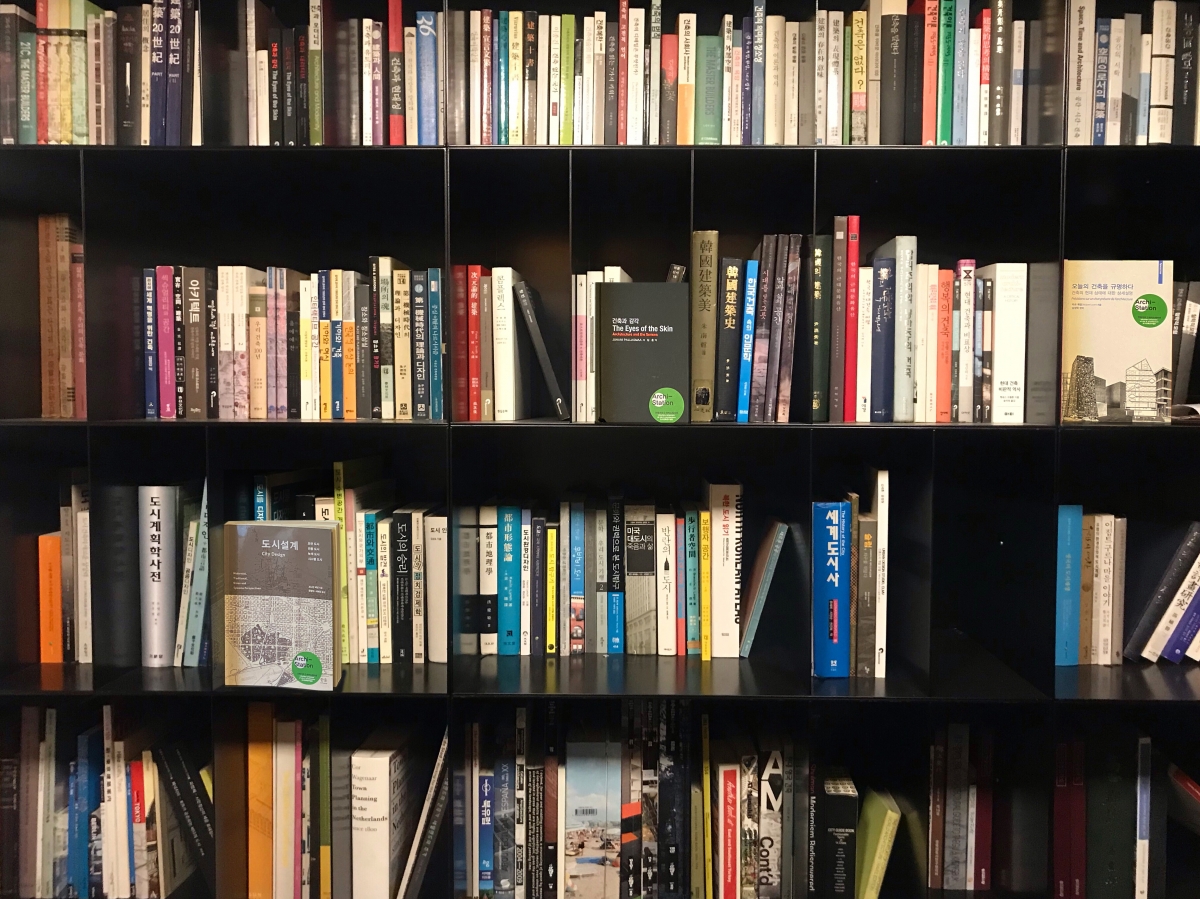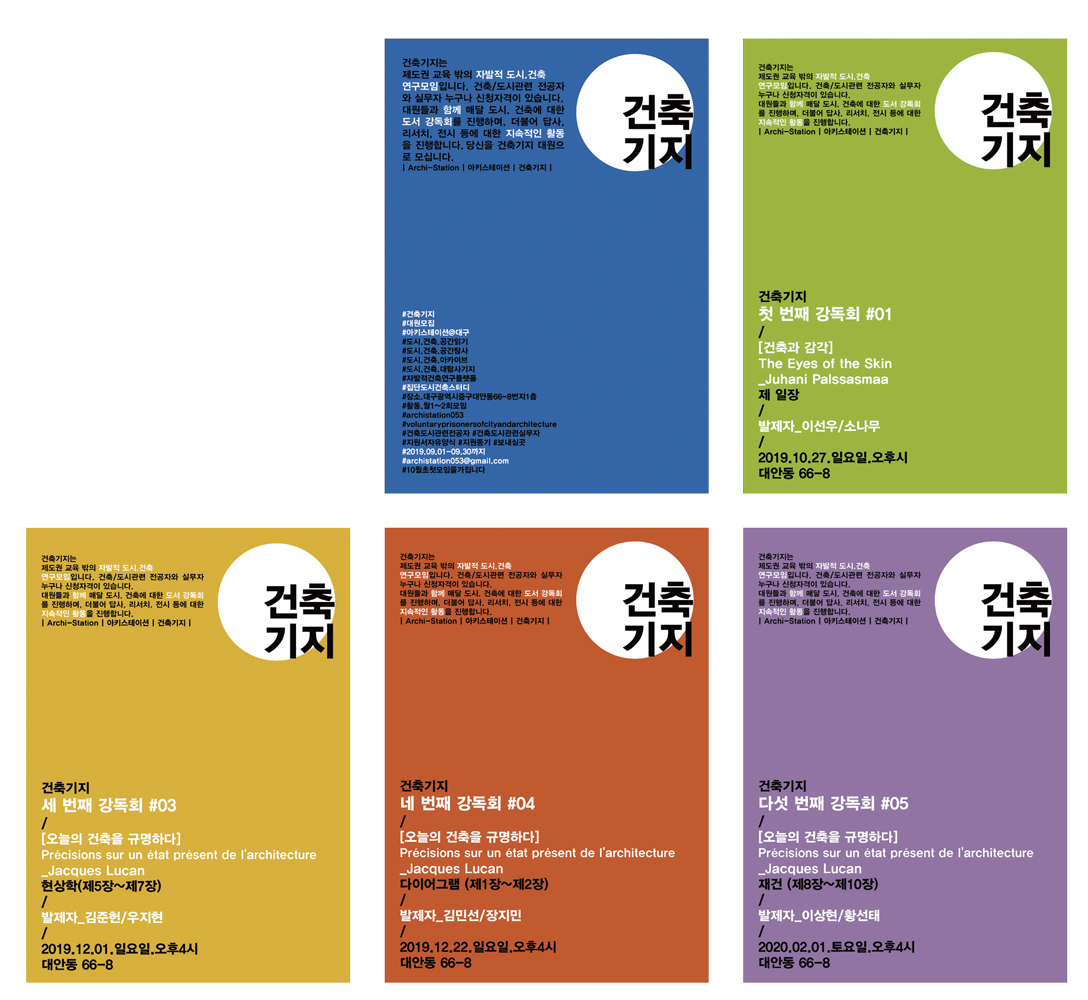Archi-Station
Leader ㅣ Woo Jihyun, Choi Youngjoon
Member ㅣ Kim Dayoung, Kim Minsun, Kim Soyeon, Kim Junheon, Park Sangjoo, So Namoo, Lee Sanghyun, Lee Sunwoo, Lee Hwaeun, Jang Jimin, Hwang Seontae
Operation period ㅣ Sep. 2019 - in progress
Main programme ㅣ reading of textsOperational purpose ㅣ To pursues further study and knowledge through reading, exploration, research, and exhibition based ventures on a common theme centred around selected cities and architecture.
Website ㅣ www.facebook.com/archistation053

Woo Jihyun co-principal, OFFICEARCHITEKTON × Choi Eunhwa
Choi Eunhwa (Choi): What made Archi-Station think of the activity of reading together, presenting ideas to each other and sharing one’s thoughts, opinion and queries on a particular subject or title?
Woo Jihyun (Woo): It originated with a personal desire to read books again in company, which had come to be neglected because of the hefty workload at the office. This idea was developed as it adds a joyful and imaginative potential to shared learning, where we read books together and talk about them with each other. Architectural practitioners have to provide a range of services that are related to spatial design at a client’s request and in light of the market economy. I don’t want it as a practice to be confined to matters of subsistence or unavoidable demands in such a hostile environment. It was an act of self-encouragement as well as act of solidarity with those who share a similar approach.
Choi: How do the reading events proceed?
Woo: First, we exclude books that don’t require further interpretation, discussion or chronological explanation, and make our initial decisions based on the recommendations of and consensus between members. Some of the books we have read so far include Juhani Pallasmaa’s The Eyes of the Skin, Jacques Lucan’s Precisions Sur Un État Présent De L’Architecture, and Jonathan Barnett’s City Design: Modernist, Traditional, Green and Systems Perspectives. Two speakers are selected for each session to open up the possibility of various interpretations and to point to unexpected absences or new lines of enquiry. The reading session is held every three weeks on Saturday afternoons. After the speaker’s presentation, all of the members raise questions and enjoy discussion.
Choi: The events are now run with no charge. What motivates Archi-Station?
Woo: We are not particularly concerned with business models. That is because we build upon a foundation of ‘voluntary research’ based on the most fundamental and historic medium of study – books. We share language to impart knowledge, and we build up solidarity based on the congeniality that comes from similar backgrounds such as shared regions, schools, fields of business, the desire to rethink the meaning of architecture, all of which has helped us to become a group of solid architects. If we have a modest place in which to weigh in, I believe our shared energy will continue long into the future.
Choi: The sessions are on hold due to the COVID-19 pandemic. When will your programme resume?
Woo: It was suspended at the point when we had begun to discuss site-visits and additional research. Nonetheless, our members will not stop reading during this hiatus. The meaning of such social gatherings, the solidarity, sense of togetherness, and shared platforms have become vital and visible in our contactless time where the extraordinary has become the ordinary. Moreover, we have come up with our own methods of communication to cope with this situation. Nonetheless, Archi-Station believes in face-to-face communication through which people can come together to discuss, listen to the views of others, develop their own ideas, and feel a sense of solidarity with those who place greater importance on the meaning of architecture and cities.

Poster of reading events by Archi-Station / Image courtesy of Archi-Station
CAMPO
Leader ㅣ Gianfranco Bombaci, Matteo Costanzo, Luca Galofaro ,Davide Sacconi
Operation period ㅣ 2015. - in progress
Main program ㅣ talk, exhibition, workshop, publication
Website ㅣ www.campo.space
CAMPO is a Roman-based platform created by four architects Gianfranco Bombaci, Matteo Costanzo, Luca Galofaro, and Davide Sacconi, as a place to discuss, study and celebrate architecture. Each of the four architects run their own office, but at the same time, they have led architectural studios under the same themes at university, participated in design competition projects as collaborations, or held an exhibition at the biennale, working together closely on architectural and urban matters despite their 15-year age gap.
These Italian architects describe the situation in Rome from the perspective of the cultural and economic crisis by comparing it that of the status quo. In the midst of the present health crisis, they have tried to derive fulfillment from their practice while exploring the essence of architecture. This is pursued instead of simply consuming architecture with an addiction to continuous updates.
CAMPO means ‘field’ in Italian, which signals both a physical place and an intellectual field based on knowledge. CAMPO defines their activities as comprehensive intellectual pursuits that locate and discover the conceptual boundaries between works related to architecture and cities. Rather than being prepared and planned by these four architects, all activities conducted here are run according to a cooperative structure between the invited and discovered parties. CAMPO provides a platform for the sharing of public opinion, and the invited and discovered members freely select the content and methods by which to proceed with their activities. Various events are held in small spaces located near the Roman Aqueduct, which are open to anyone. In addition, through the website, you can check out previous activities and content such as talks, exhibitions, and workshops.
The invited parties (architects, theorists, groups, etc.) give lectures and talks on their architectural research, cities or architects, times, regions, and theories, and exhibitions are held in parallel with the talks.
In temporary exhibitions, small books that summarise the content and talks held as part of the exhibitions are sold, archiving activities and generating profits. In addition, there is a minimal profit structure through donations, workshops, and collaboration with other organisations, but all talks are recorded and opened on the homepage for free, thereby serving as a public platform.
The foundation of Archi-station is that of a closed society that shares in the reading of books, serving as a private architectural platform for members. On the other hand, CAMPO’s activities offer a more public architectural platform that aims at exchange through a rich programme of intellectual activities and through solidarity with other well-planned and prepared groups or other platforms. Therefore, more diverse activities and participation between people is possible, and the critical discourses that govern a city can also achieve a certain integrity, diversity and utility. I think these points can be an ideal and effective platform model that serve as a forum for public opinion.




